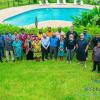World Bank Survey Reveals Lasting Impact Of COVID-19 On Vanuatu Households
The World Bank has completed its groundbreaking mobile phone survey, providing valuable insights into the ongoing impact of COVID-19 on households in Vanuatu. This innovative approach, the first of its kind in the country, yielded crucial data that will inform policy decisions and support the nation's recovery efforts.
The phone survey was conducted to gather data on the socio-economic impact of the COVID-19 crisis in Vanuatu. Community transmission of COVID-19 in Vanuatu started only in March 2022 followed by the nation-wide lockdown and other restrictions. Round 1 HFPS survey was a timely process to observe the effect of the crisis on the country. Round 1 interviewed 2,515 households both in urban and rural regions of the country from July 2022 to September 2022.
Survey topics included:
- Employment and income
- Food security
- Coping strategies
- Access to health services
- Asset ownership
All data was collected on a household level. Additionally, two individual-level datasets explored adult employment and child education. The adult dataset selects a randomly chosen adult in the household - could be the respondent of a household-level data, head of the household or another individual - and inquires about their employment status. For the child dataset, the respondent is being asked about education of a randomly chosen child in the household with more than one child.
Key Findings
- Economic hardship: The survey revealed that nearly 60% of households experienced income loss due to the pandemic, with the informal sector particularly affected.
- Food insecurity: Over 20% of households reported experiencing food insecurity, highlighting the pandemic's impact on access to essential food items.
- Education disruptions: School closures and online learning challenges affected over 50% of children, raising concerns about learning gaps and educational equity.
- Mental health concerns: The survey indicated a significant increase in stress, anxiety, and depression symptoms among individuals, highlighting the need for mental health support.
The use of mobile phones proved to be a successful data collection method, reaching households across Vanuatu, including remote areas and those traditionally difficult to access. This ensured a more accurate and representative understanding of the pandemic's impact on the country's diverse population. The World Bank's mobile phone survey has provided a vital platform for understanding the pandemic's multifaceted impact on Vanuatu's households.
Credit image: Vanuatu Daily Post



